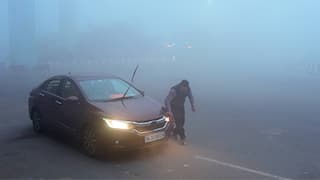Explorer
Philippine church blast: Twin bomb attack kills at least 18
It is one of the deadliest bomb attacks to strike the insurgency-plagued southern Philippines in years, and shows the insurgency in the region is still a threat despite recent steps toward peace, experts said.

At least 18 people were killed Sunday when a double bomb attack hit a Catholic church on a southern Philippine island that is a stronghold of Islamist militants, the military said, days after voters backed expanded Muslim self-rule in the region. (Representative photo)
Jolo: At least 18 people were killed Sunday when a double bomb attack hit a Catholic church on a southern Philippine island that is a stronghold of Islamist militants, the military said, days after voters backed expanded Muslim self-rule in the region. A powerful first blast shattered pews, broke windows and left bodies strewn inside the cathedral in the Catholic-majority nation's restive south as mass was being celebrated. Just moments later a second explosion outside killed troops who were rushing to help the wounded in the smoking and heavily damaged church on Jolo, which is overwhelmingly Muslim. It is one of the deadliest bomb attacks to strike the insurgency-plagued southern Philippines in years, and shows the insurgency in the region is still a threat despite recent steps toward peace, experts said. The bloodshed came less than a week after voters' decisive approval of giving Muslims in the south more control over their own affairs, which sparked hopes of quelling long-time separatist violence. "Just because the (referendum) has passed does not mean that things are going to get better overnight," said Gregory Wyatt, director for business intelligence at PSA Philippines Consultancy. "There are still militant groups that will continue to be active and pose a security threat," he told AFP. Bishop Angelito Lampon, who previously served in Jolo, said Sunday's attack may be the worst, but was certainly not the first on the church. "In my 20 years there from 1998 to last week, there were seven hand grenades lobbed into our cathedral," he told AFP. "Fortunately there was just a little damage and no casualties." Manila swiftly vowed to hunt down the attackers, but no group has claimed the bombing. "We will pursue to the ends of the earth the ruthless perpetrators behind this dastardly crime," presidential spokesman Salvador Panelo said in a statement. "The law will give them no mercy." Five soldiers, a member of the coast guard and 12 civilians were among the dead while 83 other people were wounded, said regional military spokesman Lieutenant Colonel Gerry Besana. The regional police chief Graciano Mijares put the toll slightly higher at 20 dead, lower than a figure of 27 he gave initially. The second bomb was left in the utility box of a motorcycle in the parking area outside the church, a military report said. Authorities said the notorious Abu Sayyaf kidnap-for-ransom group could be behind the blasts. "When you talk about terrorism in Sulu, the primary suspect is always the (Abu Sayyaf) but we are not discounting the possibility that there are other perpetrators," Besana told AFP. The remote island of Jolo is a base of the Abu Sayyaf, which is blamed for deadly bombings, including an attack on a ferry in Manila Bay in 2004 that claimed 116 lives in the country's deadliest terror assault. The Abu Sayyaf is a loose network of militants formed in the 1990s with seed money from Osama bin Laden's Al-Qaeda network, and has earned millions of dollars from banditry and kidnappings-for-ransom, often targeting foreigners. It is among armed networks based in the strife-torn region of Mindanao, some of whose members have pledged allegiance to the Islamic State group. Abu Sayyaf is not part of the decades-long peace process with the nation's largest separatist group, Moro Islamic Liberation Front, that culminated January 21 with the resounding approval of a new Muslim led-region in the south. Rebels and the government in Manila hope the new so-called Bangsamoro area will finally draw the investment needed to pull the region from the brutal poverty that makes it a hotspot for radical recruitment. Despite Sulu province -- which includes Jolo -- voting against creating the new region, the area will still be part of the Bangsamoro. The timing of Sunday's bombs raised questions on whether the attack was meant to derail the peace process. National Security Adviser Hermogenes Esperon said "extremist criminals" plotted the bombings. "We will not allow them to spoil the preference of the people for peace," Esperon said. "Peace must prevail over war."
Related Video
Breaking News: BJP Leaders Criticize Mamata Banerjee; Compare Bengal’s Situation to 1905 Partition
Follow Breaking News on ABP Live for more latest stories and trending topics. Watch breaking news and top headlines online on ABP News LIVE TV






































